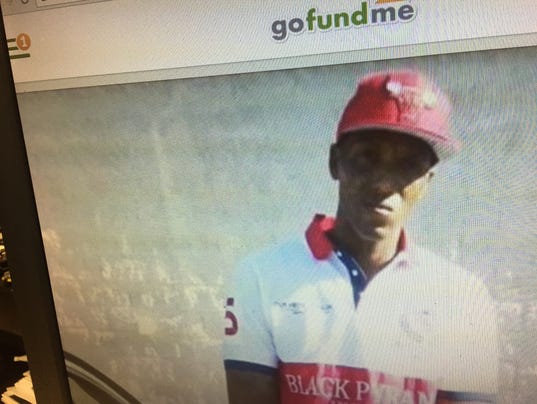
MELBOURNE, Fla. — The cellphone video taken by a group of teens while they watched a man drowning in a Cocoa pond — and not only did nothing to help him, but laughed at him — has shocked many here and beyond.
And it raised questions about how to compel people to do the right thing and punish them if they don’t, as well as highlighted concerns about the impact of social media and overexposure to violence on behavior.
Vicki Panaccione, a Melbourne psychologist who works with children and families, said she has noticed a trend of people becoming “desensitized about what’s going on in the world because of everything they’re exposed to. It can almost be overwhelming. Kids are being bombarded with all kinds of violence and aggression.”
That includes everything from violent video games and movies, to news media reports of mass shootings.
“In general, we’re just getting too used to all of the horrible things that are happening in the world,” Panaccione said. “It just becomes a ho-hum experience.”
In the Cocoa case, police said Jamel Dunn, 32, appeared to have intentionally entered a pond on July 9.
But it was what happened afterward as Dunn struggled to stay afloat that left the community shocked.
Police say a group of five 14- to 18-year-olds were laughing, cursing and making mocking comments as they filmed Dunn, who was disabled, screaming, then disappearing underwater.
The teens made no calls to 911 or otherwise came to Dunn’s assistance. His body was recovered July 14.
The medical examiner’s office determined the cause of death was drowning, Cocoa police said.
“This was over-the-top serious,” said Ann Perrin, chief of the Juvenile Division at the State Attorney’s Office that includes Brevard and Seminole counties, in reference to the teens’ actions and the video, which was posted on social media. “I, myself, have never seen anything like this before.”
In a statement, State Attorney Phil Archer said: “We can find no moral justification for either the behavior of persons heard on the recording or the deliberate decision not to render aid to Mr. Dunn.”
Postings by criminals
The teens’ behavior came to light when a family friend of Dunn saw the video on social media.
Perrin said social media is increasingly coming into play when crimes are committed — with posts by the perpetrators themselves.
“There certainly is an increase in the use of social media — almost as a way to brag” — by teens and young adults who may have been guilty of a crime, Perrin said.
WARNING: Strong language. FLORIDA TODAY has obtained a video that appears to show a man drowning in a Cocoa Pond last week while a group of teens mock the drowning man. This is the audio portion of that video. Wochit
Some examples, Perrin said, are someone posting a photo or video holding an illegal gun or posing with stolen goods or a stash of drugs.
Common social media venues for such posts include Facebook Live, Snapchat and YouTube, Perrin said.
Perrin said there also is an increasingly common trend of fights in schools being recorded by spectators, rather than the spectators seeking out help to break up the fight.
The flip side of this, Perrin said, is that, with the increased social media postings of this type, “law enforcement is using that as a tool to investigate crimes.”
Lack of cooperation
Steve Salvo, dean of the Public Safety Institute at Eastern Florida State College, said another issue that could come into play is the reluctance by some to interact with law enforcement.
Salvo, a retired commander with the Brevard County Sheriff’s Office who worked in a variety of positions for 38 years, said there are a variety of reasons for this — “everything from fear to arrogance. Maybe they just had a run-in with a law enforcement officer, and they don’t want to talk.”
Panaccione said, with some people, “there can be a sense of ‘I don’t want to get involved.’ There’s much less of a sense of community and community responsibility. And the kids are more about themselves, in general, than taking care of other people or helping other people.”
But Salvo said not everyone is like that, citing help in missing child cases as an example. Salvo also said he sees many people willing to serve in volunteer roles helping law enforcement agencies.
Charges being pursued
In the case involving Dunn’s death, Cocoa Police Chief Mike Cantaloupe is seeking to charge the teens under a Florida statute that addresses failure to report a death in such circumstances as criminal violence, an accident or a suicide.
That is a first-degree misdemeanor, punishable by up to one year in jail for an adult. The penalties would be different for a juvenile.
It will be up to the State Attorney’s Office whether to file those charges.
Cantaloupe also wants to work with Archer and other law enforcement officials to pursue new legislation to address the absence of a law Florida that would compel someone to render aid in such a situation.
‘Unspeakable’ act
“There just are no words to describe the lack of conscience within these young people,” Cocoa Mayor Henry Parrish III said in a statement Friday. “This is an isolated act of unspeakable inhumanity, and in no way is a reflection of our community.”
Parrish said he supports the push by Cantaloupe to pursue criminal charges against the teens.
“I implore the State Attorney’s Office to follow through and file the charges presented by the Cocoa Police Department,” Parrish said.
Read more:
In a statement, the Cocoa Police Department said its investigation “revealed Dunn went into the water willingly and on his own. Video evidence from a neighbor’s home security camera shows him scaling a fence and intentionally going into the pond.”
It is not known what Dunn’s motives were at the time he went into the water.
“Regardless of the circumstances surrounding his decision to enter the water that day, there is absolutely no justification for what the teens did,” Cantaloupe said. “Pursuing criminal charges is a way to hold them accountable for their own actions.”
Parrish said he is hoping for something positive to come out of this tragedy.
“If this case can be used as an example to draft new legislation, then I am committed to move forward to make that happen,” Parrish said. “More so, may this tragic incident, which has shocked all of us, cause each of us to examine ourselves and our responsibility to one another.”
Vicki Panaccione, a Melbourne psychologist who works with children and families, has this advice for parents concerned about the Cocoa case and how their children might be influenced by social media:
• Have a conversation with them about this incident, how they feel about it and what they would have done in a similar circumstance, “rather than lecturing your kids about how wrong or bad it was.”
• Talk about what they could do if they wanted to help someone in trouble or in danger, but the friends they’re with didn’t want to help.
• Set limits on what they can post on social media.
• Discuss with them what they should do if they notice someone being bullied in their school or on social media.
• Instill values in your children at a young age, such as by having them put a quarter in the collection plate at church, bring cookies over to a neighbor or do “random acts of kindness.”
[SOURCE:-usatoday.c]







